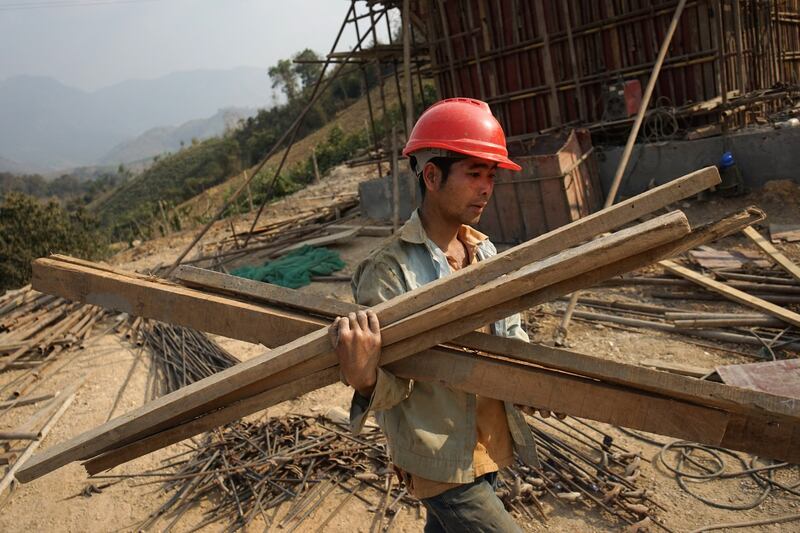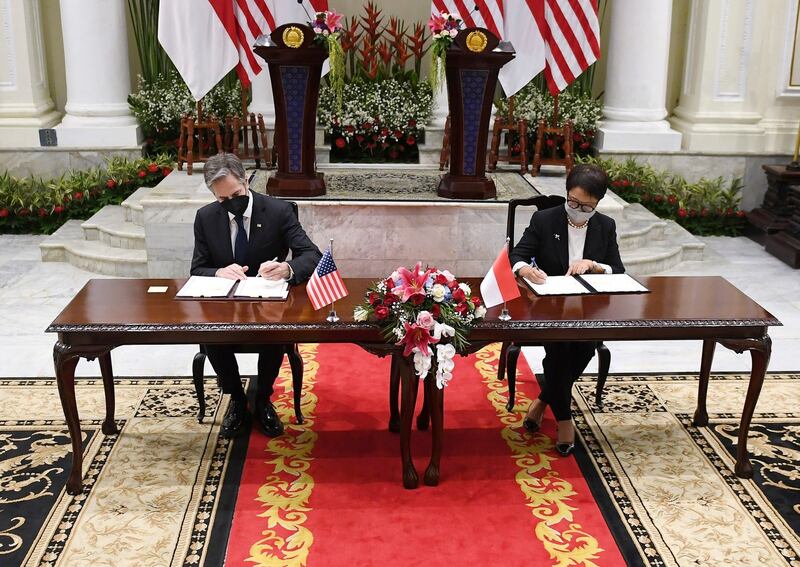Updated at 2:14 p.m. ET on 2021-12-14
The United States pledged Tuesday to help Indo-Pacific countries build better infrastructure to counter China’s ambitious connectivity scheme to construct railways, dams and power plants across the region.
During a speech in Jakarta, Secretary of State Antony Blinken signaled that Washington would also pursue closer diplomatic and military ties with countries in the region to ward off security threats. His visit to Indonesia’s capital was the first stop on his first tour of Southeast Asia as America’s top diplomat.
In thinly-veiled criticism of China’s Belt and Road Initiative (BRI), he listed frequent complaints linked to Beijing-backed infrastructure projects, including opaque contracts, the influx of foreign workers, environmental pollution and debt traps.
“Countries in the Indo-Pacific want a better kind of infrastructure, but many feel it’s too expensive, or they feel pressured to take bad deals on terms set by others, rather than no deals at all,” Blinken said in his speech at the University of Indonesia.
“So we will work with countries in the region to deliver the high quality, high-standard infrastructure that people deserve,” he said.
Blinken will also visit Malaysia and Thailand – which, like Indonesia, are founding members of the ASEAN bloc. He met with Joko “Jokowi” Widodo, the Indonesian president, a day earlier. On Tuesday night, Blinken flew from Jakarta to Kuala Lumpur.
“I’m in Jakarta on the first stop of a three-country tour of Southeast Asia because what happens in this region shapes global events, and because our relationships with countries of Southeast Asia are vital across virtually all of the foreign policy priorities that we have,” he told reporters at a local hotel later in the day.
He and his Indonesian counterpart, Retno Marsudi, he said, had just signed three bilateral memoranda of understanding “to bring our countries’ work together to another level.” These included a memorandum on maritime cooperation covering activities such as joint naval exercises and combating illegal fishing.
“[W]e will bolster Indo-Pacific security. Threats are evolving. Our security approach has to evolve with them,” he said during his speech earlier on.
The United States will “adopt a strategy that more closely weaves together all our instruments of national power – diplomacy, military, intelligence – with those of our allies and our partners,” he added.
As a strategy to counter BRI, the U.S.-led Build Back Better World Partnership (B3W) initiative, unveiled in June at the G7 summit in Cornwall, England, promises sustainable and value-driven infrastructure investment to the tune of “hundreds of billions of dollars” in low- and middle-income countries in coming years.
President Joe Biden said at the time that the program would help narrow a U.S. $40 trillion need for infrastructure projects across the developing world.
Blinken said the United States, Japan and Australia had provided more than $48 billion in government-backed financing for infrastructure for the region since 2015.
In addition, American companies have invested more than $1 trillion in the region, he said.
“And together with Australia and Japan, we launched the Blue Dot Network to start certifying high quality infrastructure projects that meet the benchmarks developed by the G20, the OECD and others, and to attract additional investors,” he said.
A four-year study by AidData, an international development research lab at U.S. university William & Mary, found that countries owed under-reported debts of at least $385 billion to China in the past two decades, and that one-third of projects under BRI have run into major implementation problems.
The hidden debts, which slipped through the scrutiny of international lenders such as the World Bank and the International Monetary Fund (IMF), and credit rating agencies, mean borrowing countries may have to repay more than they think, AidData said.

Contested waters
On the issue of the South China Sea, Blinken said the United States was determined to uphold freedom of navigation and would work with other countries to defend “the rules-based-order” in the Indo-Pacific.
“It’s not about a contest between a U.S.-centric region or a China-centric region. The Indo Pacific is its own region. Rather, it’s about upholding the rights and agreements that are responsible for the most peaceful and prosperous period this region and the world has ever experienced,” he said.
He said Beijing’s “aggressive” actions in the contested waters threatened the movement of more than U.S. $3 trillion worth of commerce every year.
“When commerce can’t traverse open seas, that means that farmers are blocked from shipping their produce, factories can’t ship their microchips, hospitals are blocked from getting life-saving medicines,” Blinken said.
He cited a laundry list of accusations against China, including distorting open markets through subsidies to its state-run companies, denying exports or revoking deals for countries whose policies it does not agree with, and engaging in illegal, unreported and unregulated fishing activities.
“Countries across the region want this behavior to change. We do too,” Blinken said.
The American president will be inviting Southeast Asian leaders for a summit in the United States “in coming months, to discuss how we can deepen our strategic partnership,” he said.
The U.S. government has yet to announce a date for a meeting between President Biden and leaders from the Association of Southeast Asian Nations. However, Cambodia’s government said a summit could take place “in the very near future,” while the Philippines said it might happen next month.
Blinken’s trip to Southeast Asia comes on the heels of tours by several other senior American officials, as Washington tries to match an increasingly assertive China in its economic and geopolitical influence in the Indo-Pacific.
“The United States recognizes that much of our planet’s future will be written in the Indo-Pacific. Our enduring commitment to this region and our collaboration with our allies and partners will help us to achieve a free and open, interconnected, prosperous, resilient, and secure region for all,” the senior-most American diplomat said.

But an article posted on China’s military news website blasted the late U.S. regional charm offensive, calling Washington “the most unreliable major power” that “often stops at paying lip service.”
"For one thing, America is only interested in military security while diplomatic engagement and economic aid and cooperation are just candies to lure in the Southeast Asian countries," said the writer of the opinion piece published on the ChinaMilitary site.
“For another, America is incapable of doing things on all fronts in parallel. With the change of administrations, its policies are never consistent, its economic strength and influence are falling, and its soft power is waning, all of which have taken a serious toll on the implementation of its strategies and policies,” the article said.
Aaron Connelly, a senior fellow at the International Institute for Strategic Studies (IISS), said Blinken’s visit had a straightforward purpose.
“Some visits are motivated by crisis or a particular agenda,” Connelly said.
“In this case, I think that Blinken is trying to restore regular order to U.S. diplomacy by visiting key Southeast Asian states, listening to his counterparts, and rebuilding relationships after the damage of the Trump years,” he told BenarNews.
Reported by BenarNews, an RFA-affiliated online news service.
